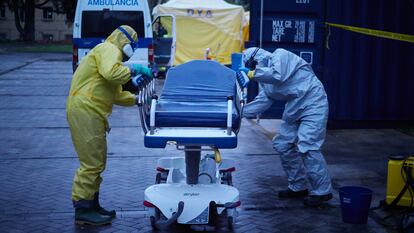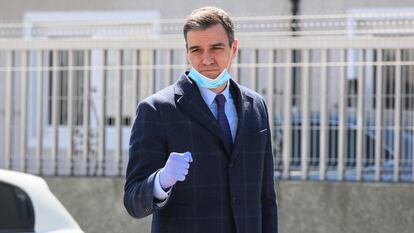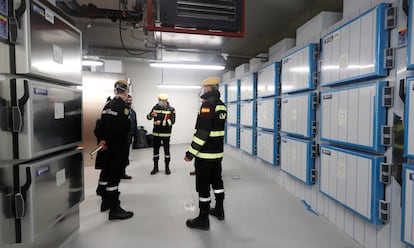Daily coronavirus deaths fall slightly in Spain but total infections exceed Italy’s
In the past 24 hours, 932 people have died, while the number of cases since the outbreak began has risen to 117,710

Official figures released on Friday by the Spanish Health Ministry showed that there were 932 deaths from the coronavirus in the last 24 hours, the first fall in fatalities recorded in four days. On Thursday, the total daily deaths came in at 950, with an increase of 8,102 new cases on the day before. This is the seventh day in a row that the number of daily victims has exceeded 800. The total number of coronavirus deaths in Spain since the health crisis began has now reached 10,935.
The ministry also stated on Friday that 7,472 new infections had been registered in the last day, bringing the total number of confirmed cases in Spain to 117,710. This figure is now above that of Italy, by around 2,000.
According to the Health Ministry figures, the number of new daily cases rose by 6.7%, which continues the downward trend seen in the past few days.
By Friday, more than 56,000 people in Spain had been hospitalized, while more than 30,000 had recovered and had been discharged from hospital since the coronavirus outbreak began. A total of 6,416 coronavirus patients remain in intensive care.
Speaking at the daily government press conference about the coronavirus crisis on Friday, María José Sierra, from the Health Ministry’s Coordination Center for Health Alerts, pointed out that “hospitalizations had increased 10%, when during the last few weeks it was at 30%.”
The evolution is positive. The number of new cases has stabilizedFernando Simón, director of the Health Ministry’s Coordination Center for Health Alerts
Fernando Simón, the director of the Health Ministry’s Coordination Center for Health Alerts, appeared at the conference via video link from home, where he is in isolation after testing positive for the coronavirus. According to the health expert, the latest figures indicate that the outbreak is stabilizing.
“The evolution is positive. The number of new cases has stabilized. The trend seen in the intensive care units indicates that the objectives are slowly being met,” said Simón.
“From this point on, we will have to evaluate whether we can begin easing the [confinement] measures,” he added, in reference to the state of alarm announced by the Spanish government on March 14 in a bid to slow the coronavirus outbreak. “There is the risk that if we do not continue the measures restricting movement, this progress will turn back.”
It is looking increasingly likely that the state of alarm, which put the entire country on lockdown, will be extended until at least April 26. Interior Minister Fernando Grande-Marlaska said on Thursday that the decision will be made “on a scientific basis” informed by the advice of medical experts, depending on what the evolving scenario looks like around the current deadline of April 12.
A new online survey by the Valencia regional government shows that 44% of Spaniards would be prepared to put up with one more month of confinement, while 21.1% would be ready to face up to three additional months. The survey, called Covid19Impact, is part of a project based on the use of technology to contain the pandemic and predict epidemiology models.
Josep Borrell, a former minister of Spain who now serves as the EU’s high representative for foreign affairs, on Friday expressed concern about the spread of the coronavirus in Africa. “If we don’t solve the problem in Africa, we will not solve it in Europe,” he said. “Unfortunately they do not have the same same healthcare capacity that we do.”
Spanish PM visits venitilator factory

On Friday, Spanish Prime Minister Pedro Sánchez left his residence in La Moncloa for the first time since declaring a state of alarm to visit a ventilator factory in the Madrid district of Móstoles. At the facility, which is run by the company Hersill, Sánchez said that “determination and strength” were needed to defeat the pandemic. “United, I am sure that we are not only saving lives [...], we are also going to beat the virus,” he said.
Madrid plans third emergency morgue

The regional government of Madrid announced on Friday that it is planning to turn an ice rink in the western municipality of Majadahonda into an emergency morgue for coronavirus victims. This is the third space in the region to be destined for this purpose. Madrid’s Palacio de Hielo ice rink and a facility inside a failed development project called the City of Justice have also been turned into makeshift morgues.
“We are facing an extraordinary situation, of great dimensions,” said José Luis Álvarez Ustarroz, the mayor of Majadahonda. “The priority now is easing the work of funeral services and mitigating the pain of families and the situation in hospitals in the region.”
In the last 24 hours, Madrid recorded 2,033 new coronavirus infections and 308 deaths. By Friday, there were 1,506 patients in intensive care – 23.5% of the total in Spain. Since the outbreak began, nearly half of all coronavirus victims in the country have died in the Madrid region, 4,483 of 10,935.
Deaths in senior centers
Senior care homes continue to be hit hard by the coronavirus crisis. On Thursday, Madrid regional premier Isabel Díaz Ayuso announced that around 3,000 senior home residents in Madrid died in March. This figure is three times higher than the 1,065 deaths reported just a week ago by the regional government. But the lack of testing means it is impossible to know how many of those fatalities were caused by the coronavirus.
“If they told the press on March 26 that there were 1,065 deaths and on April 2 they say there are 3,000, we are facing a catastrophe,” said Miguel Vázquez, the president of Pladigmare, an association of the relatives of seniors living in residences in Madrid.
The Madrid regional government also announced that it would intervene in nine private residences hit by the coronavirus. The news comes two weeks after the scale of the devastation in senior centers was revealed.
In Catalonia, 511 care home residents died from Covid-19 in March. In a press release, the regional social services department indicated that 1,221 residents have tested positive for the coronavirus, of whom 239 have been admitted to hospital. The Catalan regional government confirmed that 199 senior homes in the regions have registered cases of the coronavirus, while in another 336 residents have shown symptoms of the disease.
In the senior home Casa Asil in the Sant Andreu Palomar neighborhood of Barcelona, 31 residents have died as of March 30. Daniel M. Pero lost his 88-year-old mother María Luisa Ortega. He told EL PAÍS that the center is “letting them die, they don’t take [the residents] to the hospital.”
Criticism of Health Ministry guide
The Health Ministry has been criticized for its guide on what actions should be taken if a health worker or care worker is believed to have contracted the coronavirus. According to the document, dated March 31, workers suspected of having the virus should return to work seven days after presenting symptoms if they no longer have a fever and avoid patients with compromised immune systems.
Ángela Hernández, the spokesperson for the Madrid Doctors and Graduates Association, told EL PAÍS: “We think it’s shocking [...] Health workers are needed but we can’t let them become spreaders of the infection.”
With reporting by Elena G. Sevillano and Fernando Peinado.
English version by Melissa Kitson.
Tu suscripción se está usando en otro dispositivo
¿Quieres añadir otro usuario a tu suscripción?
Si continúas leyendo en este dispositivo, no se podrá leer en el otro.
FlechaTu suscripción se está usando en otro dispositivo y solo puedes acceder a EL PAÍS desde un dispositivo a la vez.
Si quieres compartir tu cuenta, cambia tu suscripción a la modalidad Premium, así podrás añadir otro usuario. Cada uno accederá con su propia cuenta de email, lo que os permitirá personalizar vuestra experiencia en EL PAÍS.
¿Tienes una suscripción de empresa? Accede aquí para contratar más cuentas.
En el caso de no saber quién está usando tu cuenta, te recomendamos cambiar tu contraseña aquí.
Si decides continuar compartiendo tu cuenta, este mensaje se mostrará en tu dispositivo y en el de la otra persona que está usando tu cuenta de forma indefinida, afectando a tu experiencia de lectura. Puedes consultar aquí los términos y condiciones de la suscripción digital.









































